In the Silicon Valley Distortion Field, it can seem like everyone is learning to code — that coding has become cool. Either way you slice it, talented programmers are in demand, and, as a result, there is now a litany of platforms and tutorials that propose to help anyone and everyone become a code-slinger, often from the comfort of their favorite sofa (and browser).
That’s all well and good, but if the U.S. is really going to support STEM education initiatives and encourage a more tech-literate workforce, there’s a whole lot of work to be done. Today, computer science is absent in 95 percent of high schools in the U.S. Yep. Why? Because developing curriculum for these subjects requires time and expertise, and finding the qualified candidates to teach these subjects demands significant capital to lure talented programmers away from high-paying jobs in the private sector.
That’s where CodeHS comes in. Founded by Stanford students Zach Galant and Jeremy Keeshin and incubated at StartX and Imagine K12, CodeHS is an online program built for high school students (and teachers) with no previous coding experience that intends to provide an easy and fun way to learn computer science.
To help support the early development and pilots, CodeHS has launched an Indiegogo campaign in an attempt to raise $100K before December 21st. So far, they’ve raised just over $11K. The goal, if met, is to teach “basic programming to 1,000 high school students over the next six months” and will allow it to offer its initial program to schools for free. The money raised, the founders tell us, will be put toward covering the cost of tutors that will help students troubleshoot code and offer feedback, website and curriculum development costs and integrate the platform into participating schools.
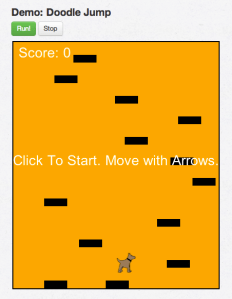 With the growing popularity of MOOCs and learn-to-code sites, it might seem like the easiest solution would be to offer a browser and project-based online resource tailored toward students. But, again, most high school students go to class every day, and Keeshin says that the key is building a site that focuses on schools first — not an automated, one-size-fits-all website.
With the growing popularity of MOOCs and learn-to-code sites, it might seem like the easiest solution would be to offer a browser and project-based online resource tailored toward students. But, again, most high school students go to class every day, and Keeshin says that the key is building a site that focuses on schools first — not an automated, one-size-fits-all website.
CodeHS operates on the premise that most online education websites offer content and tests but are missing that important, interactive human element as part of their learning processes. In other words, they lack teachers. So, CodeHS wants to connect students with a real person to help them learn, offering debugging help and feedback on programming style, etc. as part of each exercise.
Galant and Keeshin both taught Introduction to Computer Science at Stanford for three years, where they helped teach over 2,000 students the basics of programming. Their biggest takeaway? The most important element of teaching beginning coders is giving them a reliable support system. Getting stuck is part of learning, but the frustration of not knowing how to fix a problem or knowing what questions to ask is part of why online learn-to-code programs suffer from high dropout rates.
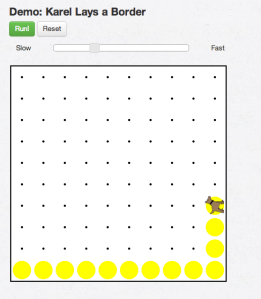 But the answer is not just throwing up forums, Keeshin says. It’s giving students the right bump, or the right explanation at the right time. So, when students begin learning through CodeHS, the first program is simple — it’s about getting “Karel” (a dog) to move around the screen. It grounds learning in basic problem solving, not jargon and syntax and, right off the bat, if they get stuck, they can turn to the platform’s instructional videos, and if that doesn’t answer their questions, they can ask questions of real, live tutors.
But the answer is not just throwing up forums, Keeshin says. It’s giving students the right bump, or the right explanation at the right time. So, when students begin learning through CodeHS, the first program is simple — it’s about getting “Karel” (a dog) to move around the screen. It grounds learning in basic problem solving, not jargon and syntax and, right off the bat, if they get stuck, they can turn to the platform’s instructional videos, and if that doesn’t answer their questions, they can ask questions of real, live tutors.
Focusing, instead, on getting a job — the professional end goal of many code-learning sites — causes them to lose sight of the fundamentals. They focus on job training rather than problem solving, what it means to write a good program, programming style, program readability and taking big problems and breaking them down into smaller ones, Keeshin says.
That being said, learn to code sites have succeeded in pushing the ball forward in terms of accessibility. Taking advantage of that, CodeHS doesn’t require teachers to install a development environment or use a terminal. All they have to do is open their browser. While students will likely get the most out of CodeHS if it’s being offered in a computer science class taught by someone familiar with CS, the platform allows teachers to learn right along with their students.
The co-founders say that they’ve had a number of English teachers who understand the importance of teaching their students computer science, pick up the program and begin learning themselves, helping their classes or work groups along the way. In terms of cost, at this point CodeHS is priced on a case-by-case basis. While the business model is still a work in progress, the co-founders have begun toying with the idea of using standard enterprise software pricing, like, say, offering CodeHS at $100/seat.
CodeHS wants to integrate its computer science education program into districts and schools across the country. Traditionally, that’s been a tough sell for edtech entrepreneurs, turning many away thanks to the slow nature of the sales process and cycle. The CodeHS founders are aware of that, they say, and are in it for the long haul. They’re also looking to “teach as many low-income students as possible” and said that at least 300 of the first 1,000 students taught will qualify as low-income.
For all the noise in the U.S. about world class higher education and cutting edge technological innovation, teaching computer science in the lower echelons of the educational system hasn’t been a priority. Instead, other countries are leading the way, like Estonia, for example, which has begun the march toward implementing universal computer science education beginning in first grade.
Galant and Keeshin believe that the U.S. has to follow suit, so they’re starting where there’s the biggest need: high school. Though Galant says that several middle school classes in California have already begun testing the platform. The earlier students can begin learning computer science, the more prepared they will be to enter the work force down the road.
By promoting STEM and making computer science accessible to young people, essentially for free, the CodeHS founders hope that they can play a role in helping to make technical education a bigger part of the educational system. In 41 states, computer science doesn’t count towards graduation and that’s not going to change on its own.
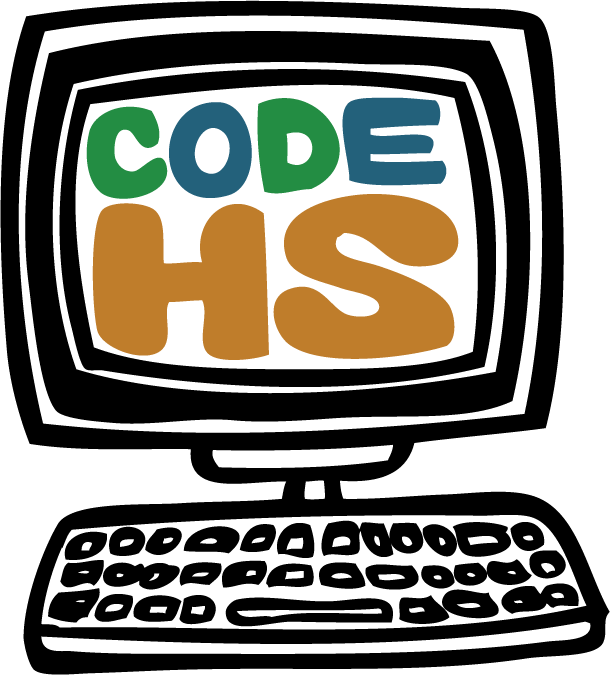
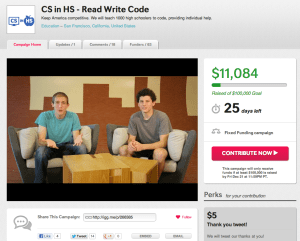
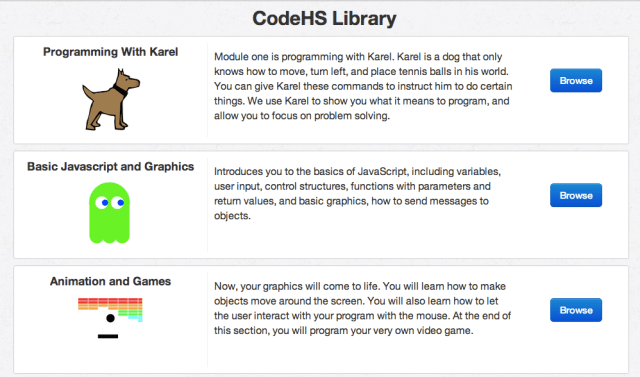






























Comment